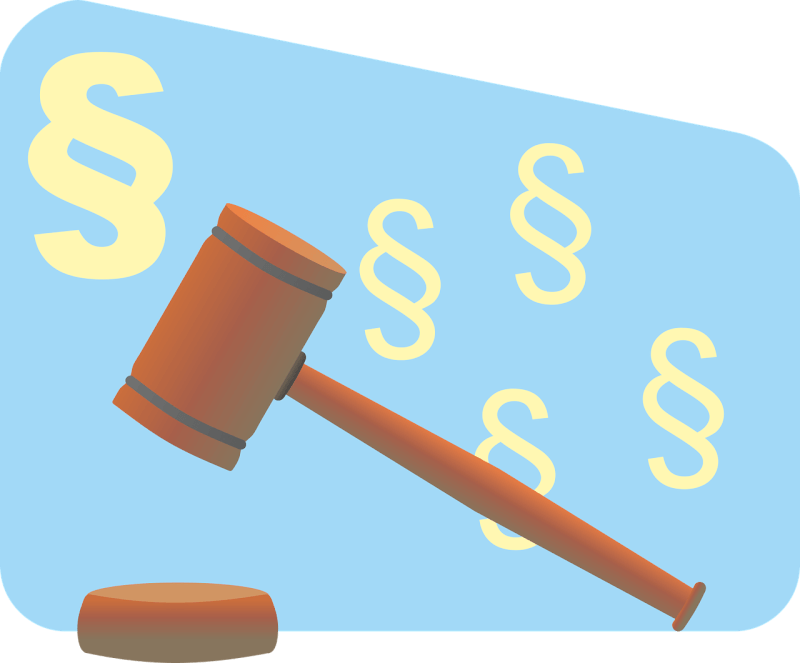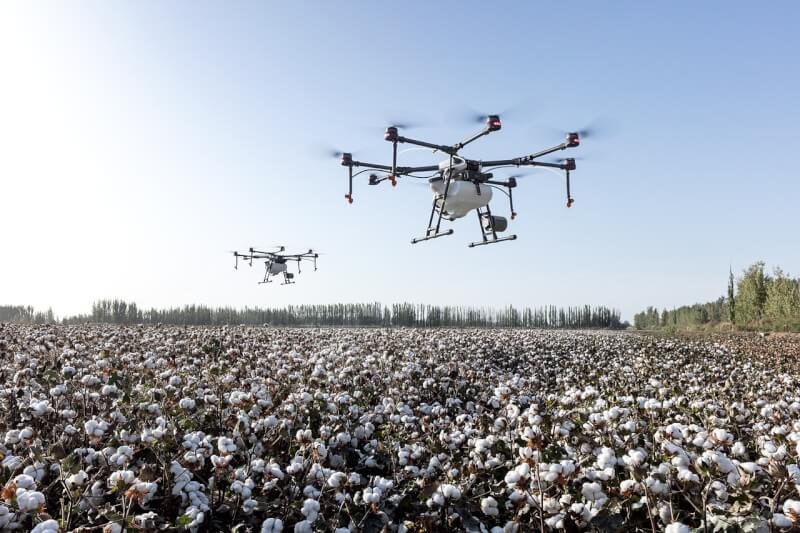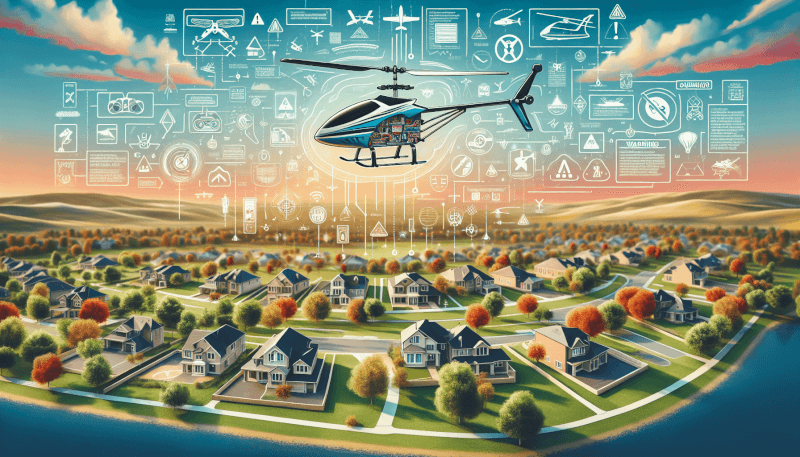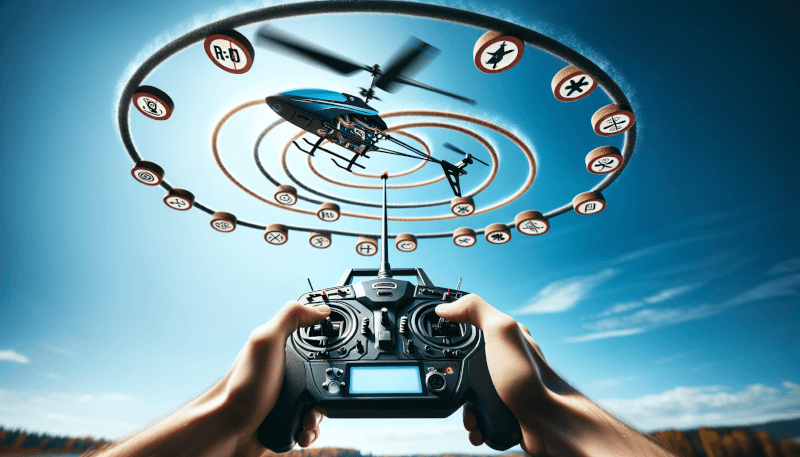If you’re an RC helicopter enthusiast, then you’re probably familiar with the exhilaration of soaring through the skies, performing daring maneuvers and capturing breathtaking aerial shots. However, it’s important to remember that the world of flying RC helicopters is not without its regulations and laws. Just like any other hobby or activity, there are certain guidelines and rules that need to be followed to ensure safety and compliance. In this article, we will explore the intricacies of navigating local regulations and laws for flying RC helicopters, providing you with the essential information to pursue your passion responsibly.

Understanding Drone Regulations
Flying RC helicopters is an exciting and rewarding hobby, but it’s important to understand and adhere to the regulations that govern their use. There are different types of regulations to be aware of, including those set by the Federal Aviation Administration (FAA) and local rules and restrictions. Additionally, it’s crucial to have suitable insurance coverage for your RC helicopter.
Different types of regulations
When it comes to flying RC helicopters, there are a variety of regulations that you need to be familiar with. These regulations can differ based on whether you are flying for recreational purposes or for commercial purposes. For recreational use, there are specific rules set by the FAA that outline where and how you can fly your RC helicopter. Commercial use brings additional requirements and regulations that must be followed. Understanding the specific regulations that apply to your situation is essential for safe and lawful flying.
Federal Aviation Administration (FAA) regulations
The FAA is responsible for overseeing aviation in the United States, including the use of drones and RC helicopters. They have established regulations that apply to all drones, including RC helicopters, regardless of their size or weight. These regulations cover various aspects, such as registration, airspace restrictions, and safe flying practices. It is crucial to familiarize yourself with the FAA regulations and ensure that you comply with them to avoid fines and penalties.
Local rules and restrictions
In addition to federal regulations, there may also be local rules and restrictions that apply to flying RC helicopters. Different cities, counties, and municipalities may have their own regulations regarding where and when you can fly, as well as any specific permits that may be required. Researching and understanding these local laws is vital to ensure that you are flying within the legal boundaries.
Insurance requirements
While it’s not a legal requirement, having insurance coverage for your RC helicopter is highly recommended. Accidents can happen, and having insurance can help protect you financially in case of any damages or injuries caused by your RC helicopter. Some homeowner’s insurance policies may provide coverage for RC helicopters, but it’s essential to check with your insurance provider to understand the extent of coverage and any limitations or exclusions that may apply. Additionally, there are specialized insurance options available specifically tailored to the needs of RC helicopter enthusiasts.
Identifying Relevant Local Laws
Once you have a good understanding of the general regulations, it’s important to identify and familiarize yourself with the specific local laws that apply to your area.
Researching local ordinances
Start by researching the local ordinances that pertain to RC helicopter flying in your area. These can typically be found on the websites of city or county governments, or by contacting relevant government departments. Pay close attention to any restrictions on flying locations, flight times, or noise limits that may be in place. Understanding these local rules will help you fly responsibly and respect the needs of your community.
Contacting local authorities
If you are unsure about any specific regulations or have questions regarding the local laws, it’s always a good idea to contact the local authorities responsible for regulating RC helicopter flying. This could be the local police department, park authorities if you plan to fly in parks, or the aviation department if your city has one. These authorities will be able to provide you with accurate and up-to-date information regarding regulations and any necessary permits or authorizations that may be required.
Understanding airspace restrictions
Airspace restrictions are an important consideration when flying RC helicopters. There are certain areas, such as airports, military bases, and national parks, where flying is strictly prohibited or heavily restricted. It is crucial to familiarize yourself with these airspace restrictions and ensure that you do not fly in restricted areas. Ignoring airspace restrictions can result in serious consequences, including legal penalties and posing a significant safety risk to manned aircraft.
Identifying no-fly zones
Certain areas are designated as no-fly zones for RC helicopters, typically due to safety concerns or sensitive locations. These may include densely populated residential areas, schools, hospitals, government buildings, and sensitive infrastructure. It is essential to identify and respect these no-fly zones to ensure the safety and privacy of individuals. Be sure to research and understand the specific no-fly zones that apply to your area to avoid any unintentional violations.
Registering Your RC Helicopter
Registering your RC helicopter with the FAA is a crucial step to ensure compliance with federal regulations. The registration process is relatively straightforward, but it’s important to understand the requirements and limitations.
FAA registration process
To register your RC helicopter with the FAA, you will need to visit their official website and follow the registration process outlined there. The registration process typically requires you to provide your contact information, including your name and address. You will also need to provide the make, model, and serial number of your RC helicopter. Once registered, you will receive a unique registration number that must be prominently displayed on your RC helicopter.
Required documentation
In addition to registering your RC helicopter, it’s important to keep any necessary documentation readily available. This may include your registration certificate, proof of insurance coverage if applicable, and any permits or authorizations required by local regulations. Having these documents easily accessible will ensure that you can provide them when requested by authorities.
Age and weight limitations
The FAA has specific age and weight limitations for individuals operating RC helicopters. For recreational use, operators must be at least 13 years old. However, if you are flying for commercial purposes, a remote pilot certificate is required, and you must be at least 16 years old. Additionally, the weight of your RC helicopter must not exceed certain limits determined by the FAA. It is crucial to adhere to these limitations to ensure safe and legal flying.
Renewal and expiration
Your FAA registration for your RC helicopter is valid for a three-year period. It’s important to keep track of this expiration date and to renew your registration before it expires. Failing to renew your registration can result in penalties and may impact your ability to fly legally. Stay organized and set reminders to ensure that your registration remains up to date.
Obtaining necessary permits
In certain situations, you may need to obtain permits or authorizations to fly your RC helicopter. These permits are usually required for specific types of flying or in certain locations.
Airspace authorization
If you plan to fly your RC helicopter in controlled airspace or near airports, you may need to obtain airspace authorization from the FAA. Controlled airspace includes areas around airports and other areas with heavy aircraft traffic. The FAA has an online portal where you can apply for airspace authorization. Be prepared to provide details about your intended flight, including the location, dates, and times. It’s important to submit your application well in advance to allow for processing time.
Temporary flight restrictions (TFRs)
Temporary flight restrictions (TFRs) are put in place by the FAA to protect certain areas or events. These events could include major sporting events, hurricane response efforts, or airspace used by emergency responders. If there is a TFR in place, it is crucial to respect the restrictions and not fly your RC helicopter in the designated area. Violating a TFR can result in serious consequences and potential legal penalties.
Local event permits
If you plan to fly your RC helicopter at a specific event or gathering, you may need to obtain a permit from the organizers or local authorities. Events such as airshows, Drone Racing League races, or community gatherings may have specific rules and regulations in place for flying RC helicopters. Contact the event organizers or local authorities well in advance to understand the requirements and obtain any necessary permits.
Parks and recreational permits
Flying RC helicopters in parks or recreational areas may also require permits or authorizations. Many parks have designated areas for RC helicopter flying and have specific rules and regulations that must be followed. Contact the park authorities or local parks and recreation department to understand the specific requirements for flying in these areas. Obtaining the necessary permits will ensure that you can enjoy your hobby in a safe and responsible manner.

Maintaining Safe Flying Practices
Safety should always be a top priority when flying RC helicopters. Adhering to certain guidelines and best practices will help ensure the safety of yourself and others around you.
Adhering to height and distance restrictions
The FAA has specific height and distance restrictions for RC helicopter flying. Generally, you must fly below 400 feet above ground level and maintain a safe distance from people, buildings, and other aircraft. It is essential to adhere to these restrictions to avoid potential collisions and ensure the safety of manned aircraft and individuals on the ground.
Avoiding crowded areas and sensitive locations
To minimize potential risks and ensure the privacy and safety of others, it’s important to avoid crowded areas and sensitive locations when flying your RC helicopter. This includes busy parks, populated residential areas, school grounds, and private properties without permission. Be mindful of your surroundings and choose a location that provides a safe and open space for flying.
Maintaining visual line of sight
Maintaining a visual line of sight with your RC helicopter is vital for safe operation. Always keep your RC helicopter within your direct line of sight, as this allows you to quickly react to any obstacles or potential dangers. Avoid flying in areas where your line of sight may be obstructed, such as behind buildings or trees. Maintaining visual contact with your RC helicopter ensures that you can safely navigate and avoid any potential hazards.
Considering weather conditions
Weather conditions play a significant role in the safety and stability of RC helicopter flight. Always check the weather forecast before flying and avoid flying in adverse conditions, such as high winds, heavy rain, or fog. These conditions can significantly affect the control and stability of your RC helicopter and increase the risk of accidents or damage. Fly in calm weather conditions to ensure safe and enjoyable flights.
Understanding Privacy and Surveillance Laws
Respecting privacy rights and avoiding any potential surveillance activities with your RC helicopter is crucial to maintain trust and uphold the law.
Respecting privacy rights
When flying your RC helicopter, it’s essential to respect the privacy rights of individuals. Avoid flying over private properties without permission and ensure that you do not capture or record any images or videos that may infringe on someone’s privacy. Always be mindful of the potential impact your flights may have on individuals around you and fly responsibly to maintain privacy boundaries.
Avoiding surveillance activities
Using an RC helicopter for surveillance activities, such as spying on individuals or invading their privacy, is strictly prohibited and illegal. Surveillance activities without proper authorization can result in severe penalties, including fines and legal action. It is important to use your RC helicopter responsibly and solely for recreational or authorized purposes to ensure compliance with privacy laws.
Obtaining consent for recording
If you plan to capture images or videos during your RC helicopter flights, it’s important to obtain the necessary consent from individuals who may be included in the footage. This includes obtaining consent before flying over private properties or capturing images of people in public spaces. Respecting the privacy and consent of individuals is essential to maintain trust and adhere to privacy laws.

Interacting with Law Enforcement
Occasionally, you may encounter law enforcement officers while flying your RC helicopter. Knowing how to appropriately interact with them can help ensure a positive and lawful experience.
Being prepared with proper documentation
When approached by law enforcement officers, it’s crucial to have your proper documentation readily available. This includes your FAA registration certificate, proof of insurance coverage (if applicable), and any permits or authorizations required by local regulations. Being prepared with these documents shows that you are a responsible and law-abiding pilot, which can help defuse any potential concerns or misunderstandings.
Cooperating with authorities
If approached by law enforcement officers, it’s important to remain calm and cooperate fully. Answer any questions they may have and provide any necessary information or documentation. Cooperating with authorities will help establish a positive interaction and demonstrate your commitment to flying responsibly and within the boundaries of the law.
Understanding enforcement actions
In some cases, law enforcement officers may take enforcement actions if they believe you are in violation of any regulations or laws. These actions can range from issuing warnings or citations to confiscation of your RC helicopter. It’s essential to understand the potential consequences of non-compliance and to address any violations promptly and appropriately.
Addressing complaints or violations
If you receive any complaints or become aware of any violations regarding your RC helicopter flying, it’s important to take them seriously and address them promptly. This may involve communicating with the individuals who lodged the complaint, cooperating with law enforcement, or adjusting your flying practices to ensure compliance. Addressing complaints or violations in a timely and respectful manner is crucial to maintain a positive reputation within the community and preserve the integrity of the RC helicopter hobbyist community as a whole.
Participating in Local Communities
Engaging with the local RC helicopter community can provide valuable support, resources, and opportunities for growth and learning.
Joining local RC helicopter clubs
One of the best ways to connect with other RC helicopter enthusiasts is to join local RC helicopter clubs. These clubs often host regular gatherings, events, and training sessions where you can meet fellow hobbyists and share your experiences. Joining a club can provide a sense of community and allow you to learn from more experienced flyers, enhancing your flying skills and knowledge.
Attending workshops and training sessions
Workshops and training sessions are an excellent way to enhance your RC helicopter flying skills and stay up to date with the latest techniques and safety practices. Many RC helicopter clubs or local hobby shops offer workshops or training sessions where you can learn from experienced pilots and receive valuable guidance. Attending these educational opportunities not only improves your flying abilities but also emphasizes the importance of safety and responsible flying.
Sharing knowledge and experiences
Sharing your knowledge and experiences with other RC helicopter enthusiasts is a great way to contribute to the local community. Whether through online forums, social media groups, or club gatherings, sharing tips, tricks, and stories helps foster a sense of camaraderie and allows others to learn from your experiences. By actively participating and engaging with others, you contribute to a supportive and vibrant RC helicopter community.
Contributing to safety initiatives
Safety is a collective responsibility, and actively contributing to safety initiatives within the RC helicopter community is essential. This can involve sharing safety guidelines and best practices with other hobbyists, promoting responsible flying habits, or organizing safety events or campaigns. By actively participating in safety initiatives, you help create a culture of safety and responsibility within the community for the benefit of all flyers.

Keeping Abreast of Regulatory Changes
Regulations surrounding drone and RC helicopter flying are subject to change and evolve over time. To ensure compliance and stay informed, it’s important to keep up to date with any regulatory changes.
Following updates from FAA and local authorities
The FAA and local authorities may periodically issue updates, amendments, or new regulations regarding RC helicopter flying. Stay informed by regularly checking their websites, subscribing to their newsletters or email updates, or following their social media accounts. Keeping up to date with these official sources ensures that you are aware of any changes that may affect your flying activities.
Subscribing to relevant newsletters or forums
There are many online newsletters, forums, and communities dedicated to RC helicopter flying. Subscribing to these newsletters or participating in these forums can provide valuable insights into upcoming changes, new regulations, and best practices. It also allows you to engage with other members of the RC helicopter community and share knowledge and experiences.
Attending public meetings or briefings
Some local authorities may hold public meetings or briefings to discuss upcoming regulatory changes or gather input from the community. Attend these events if possible to stay informed and voice any concerns or opinions you may have. By actively participating in public meetings, you can help shape the regulatory landscape in a way that benefits the RC helicopter community.
Engaging with drone advocacy groups
There are numerous drone advocacy groups and organizations dedicated to representing the interests of hobbyist and commercial drone users. These groups often engage with government authorities, provide input on regulatory matters, and advocate for responsible and safe drone use. Consider joining or supporting these groups to not only stay informed but also contribute to the ongoing dialogue and advocacy efforts.
Consequences of Non-Compliance
Failing to comply with drone regulations and local laws can have serious consequences. It’s important to understand the potential risks and impact of non-compliance.
Legal penalties and fines
Non-compliance with drone regulations can result in significant legal penalties and fines. These penalties can vary depending on the severity of the violation and any resulting damages or injuries. It’s crucial to abide by the regulations, obtain any necessary permits or authorizations, and fly responsibly to avoid any potential legal consequences.
Confiscation of RC helicopter
In cases of severe or repeated violations, law enforcement authorities may confiscate your RC helicopter. This not only results in financial loss but also prevents you from continuing to enjoy your hobby. By adhering to the regulations and flying responsibly, you can avoid the risk of having your RC helicopter confiscated.
Negative impact on the hobbyist community
Non-compliance with regulations can have a negative impact on the entire RC helicopter hobbyist community. It could result in increased public scrutiny, stricter regulations, or even outright bans on RC helicopter flying in certain areas. It’s crucial to be a responsible pilot and uphold the highest standards of safety and ethical conduct to preserve the reputation and future of the hobby.
Safety hazards and accidents
Failing to comply with regulations can lead to safety hazards and accidents. Flying in restricted airspace or in areas with dense populations increases the risk of collisions with manned aircraft or injury to individuals on the ground. By following the regulations and flying safely, you contribute to a culture of safety and minimize the risk of accidents or injuries.
In conclusion, understanding and complying with drone regulations and local laws is essential for safe and legal RC helicopter flying. Familiarize yourself with the applicable regulations at both the federal and local levels, obtain the necessary permits and authorizations, and maintain safe flying practices. Keep up to date with any changes through official sources and actively engage with the RC helicopter community. By being a responsible pilot and respecting privacy rights, you can ensure an enjoyable and fulfilling RC helicopter flying experience while preserving the reputation and future of the hobby.



